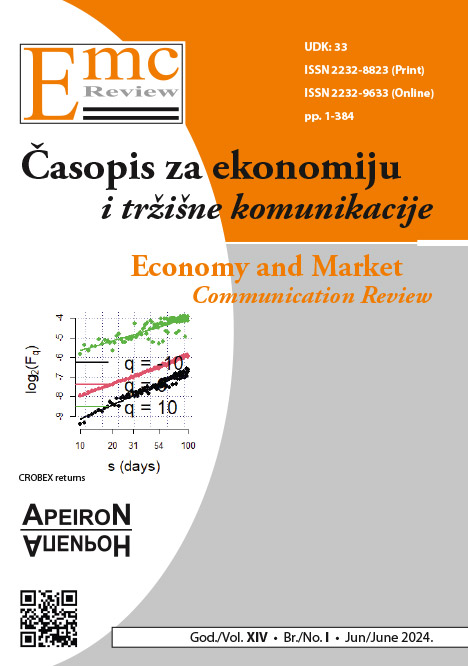WAGE STABILITY IN THE REPUBLIC OF SRPSKA IN THE LIGHT OF LONG-TERM MACROECONOMIC STABILITY
DOI:
https://doi.org/10.7251/EMC2401165KKeywords:
public finances, fiscal policies, economy, employment, salaryAbstract
The paper analyzes the dynamics of net wages in Republika Srpska to assess the extent to which a certain element of macroeconomic policy can serve as a powerful tool for the financial stabilization of the domestic economy on a long-term basis. For this purpose, data on the number of employees and monthly salaries in RS from 2012 to 2022 were analyzed, specifically the correlation between the number of employees by group and the amount of their net salary. The results show continuous growth in total employment and monthly wages, indicating a positive macroeconomic trend. Pearson’s correlation coefficient of -0.989 and regression analysis confirm a strong negative correlation between the number of employees in RS earning up to 599 BAM and those earning over 2,500 BAM, indicating a shift in the labor force towards higher wages. However, in the long run, faster wage growth than employment and inflation can create pressure on costs and thus destabilize finances. Challenges such as sustainable financial management and staff sustainability remain significant factors that must be addressed. The research ends with recommendations for adapting existing policies to ensure the long-term stability and growth of the Republika Srpska economy. The need for further research is emphasized to deepen the understanding of the effect of government measures in the area of wages and their alignment with global economic trends on the financial stability of the country. It would be interesting to investigate the movement of salaries by the group from the aspect of their sustainability in inflation conditions and in light of potential migrations to countries for a better standard. Additionally, exploring the impact of external economic shocks and regional disparities on wage dynamics would provide a more comprehensive understanding of the financial landscape in Republika Srpska. Future studies could also consider the role of technological advancements and their influence on wage structures and employment patterns, offering valuable insights for policymakers. Moreover, examining the impact of educational and skill development initiatives on wage growth and employment opportunities could help identify strategies to enhance economic resilience.
